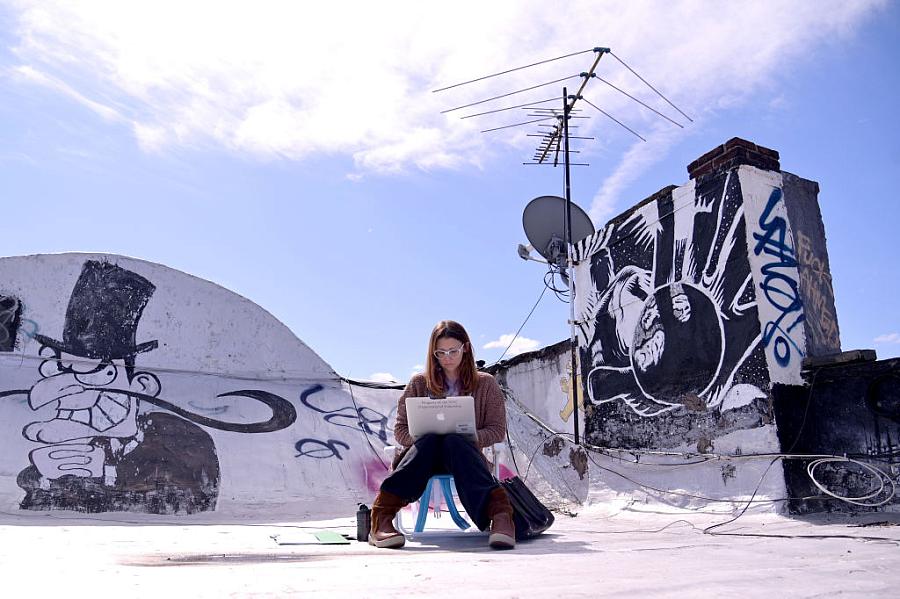Remote work can be a lifesaver for people struggling with mental illness or bias on the job

(Photo by Michael Loccisano/Getty Images)
Sheri Munsell began working remotely a decade ago to prioritize her mental health. She had struggled with managing her depression and anxiety when she worked in retail and other brick-and-mortar jobs. Adding to the stress, she said, was the racial bias she experienced. Munsell, who is Black, said the owners of one store where she worked admitted they were checking her cash box more often than those of her white colleagues.
“Every day when I came home from work, I was already exhausted from gritting my teeth all day and not responding to people,” she recalled. Remote work brought so much relief that Munsell started a Facebook group and then a nonprofit, Hope Gain Center of West Michigan, to connect people with mental illness to remote opportunities.
In the two-plus years since the world was introduced to COVID, the demand for such services has skyrocketed, she said.
Much has been written about how the disruption and isolation of pandemic lockdowns have fueled a surge in mental illness, and how working from home has been a nightmare for millions of people, especially for parents with kids at home. But there’s a flip side to the story. Like Munsell, many people have found that remote work is good for their mental health. The benefits may be greatest for those who have faced discrimination and hostility on the job because of race, gender identity or other factors.
Studies show that discrimination is associated with a higher risk of mental illness and psychological distress. UCLA researchers tracked 1,834 Americans ages 18 to 28 for a decade and found that the psychological impact of discrimination is cumulative: the more these young adults experienced discrimination, the greater their risk for mental health or behavioral problems.
For marginalized employees, remote work can create a buffer against microaggressions, stressful or toxic office politics, and watercooler chatter about major news that causes duress, — for example, Florida’s ‘Don’t Say Gay’ bill.
“When you think about someone who might experience depression or anxiety, for example, you can imagine how difficult it is to put on the front of everything being OK for eight-plus hours a day,” said Patrice Le Goy, a licensed marriage and family therapist.
Pressure to conform to gender-binary norms
Writer Adryan Corcione doesn’t have to imagine it. Corcione lived the stress of having to present themselves in an inauthentic way at the office. Inside the workplace, employees are often pressured to conform to dress codes, single-gender bathrooms and other norms that enforce the gender binary. Research by McKinsey & Company has found that more than half of transgender employees do not feel comfortable being out at work.
“Before I was ‘out’ at work as non-binary, I recall hearing microaggressive comments about the way I dressed at one corporate office,” Corcione said. “I was expected to wear dresses and heels as part of this unspoken dress code.”
Corcione wore their roommate’s gender-affirming hand-me-downs to assimilate to office life. After three months in the role, they quit and went back to remote work.
In addition to a less stressful environment, remote work can provide more opportunities to people who struggle to obtain or keep a job because they are not able to show up consistently at a workplace — for example, people who have disabilities or chronic illnesses or who lack access to reliable transportation. A 2021 report highlights how disabled workers benefit from remote opportunities.
Employees are also more likely to engage in healthy behaviors when working from home. Without a commute, workers may have more time to exercise or visit with family or friends.
“The health benefit of being able to pause, take a walk outside, or speak to a therapist or doctor during the day without having to explain yourself to your boss is immeasurable,” Le Goy said. “And now we have the chance to envision a different way of working and being.”
Cubicle shock
Graphic designer Kim Kibby took a job in an office after more than a decade working remotely.
“It was a culture shock to find myself in a cubicle farm with constant interruptions, freezing temperatures, and noise,” she said.
She learned she has mild misophonia, a disorder in which certain sounds trigger an intense emotional reaction. Common office sounds like typing or people eating at their desks were unbearable.
“I would wear earplugs and noise-canceling headphones with music or white noise playing to help me cope,” Kibby said.
Since Sheri Munsell went remote, she has made a career of helping others do the same. In 2018, she created the Facebook group called Legit Work from Home Jobs for people interested in remote work. Within two years, the group amassed 65,000 members. It now claims 155,600. In 2020, Munsell expanded the group into a nonprofit, Hope Gain Center of West Michigan, which helps people with mental illness find and build remote careers.
“When we were talking to companies about offering remote options, a big thing we heard was ‘Well, we don’t trust people would get their work done,’” Munsell said. “And our answer to that is always, ‘Why are you hiring people you don’t trust?’”
Since COVID unleashed a work-from-home revolution, the nonprofit has launched a mentoring program, free counseling and a Companies That Care Database. To be listed, a company must be nominated by a current employee who has mental health challenges and approved by the Hope Gain Center.
The growth of the center isn’t surprising. According to Gallup, nine of 10 remote-capable employees prefer working arrangements with remote flexibility going forward.
“I think that a lot of us realized that the traditional office environment didn’t work for us,” Le Goy said. “However, this is the first time that people are feeling empowered to make different decisions.”

